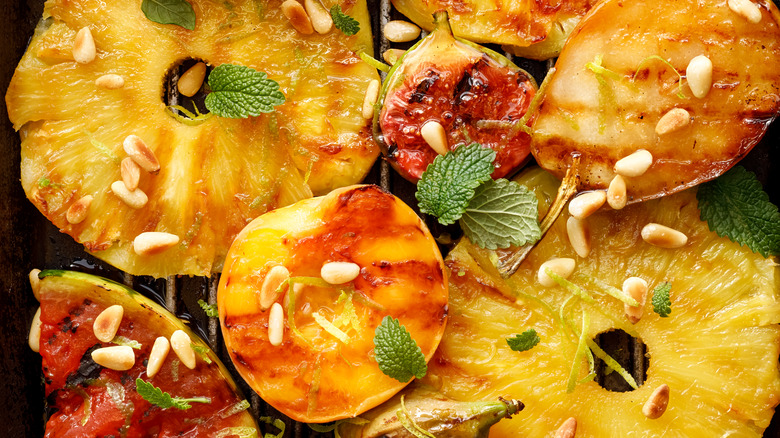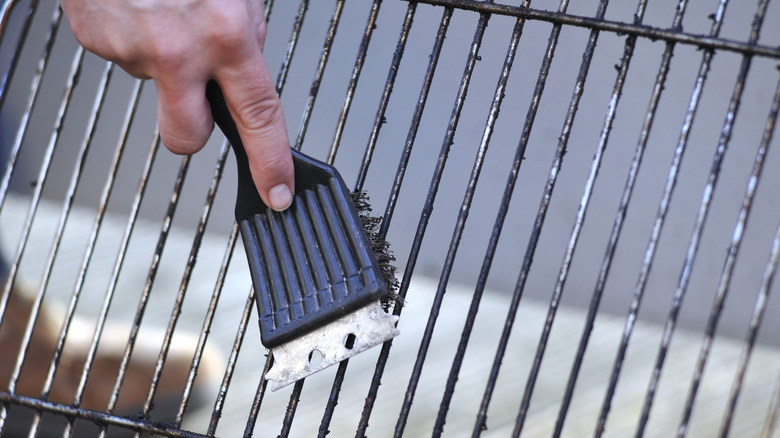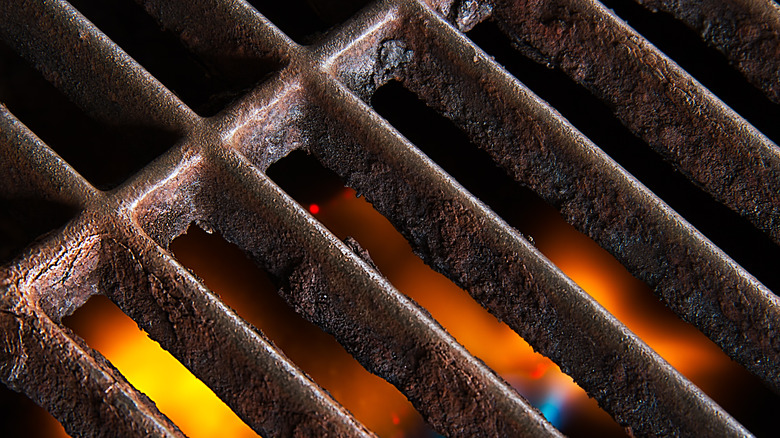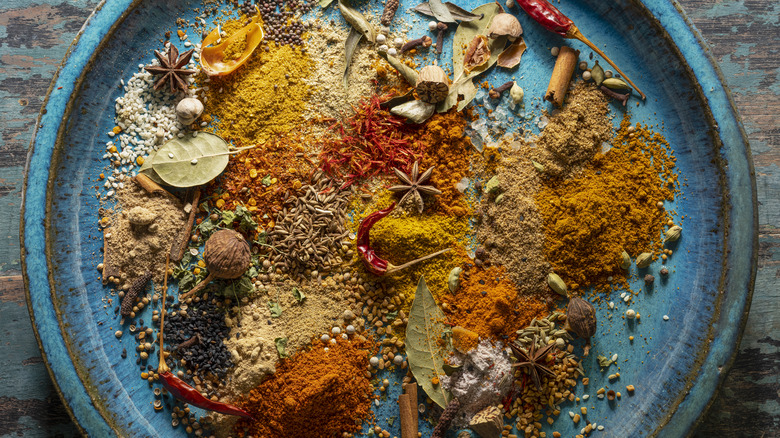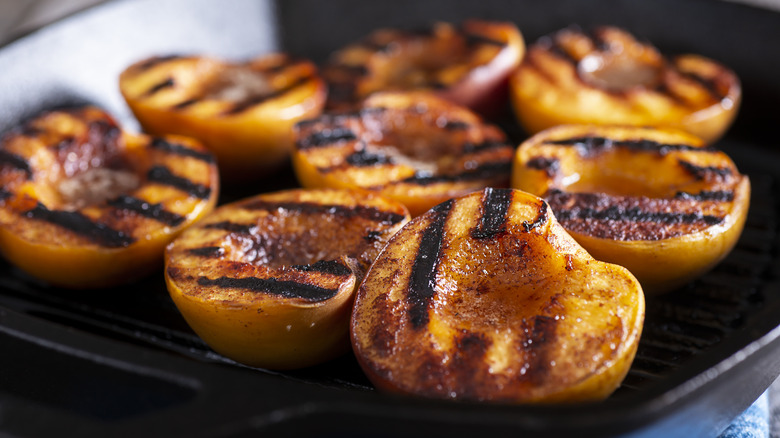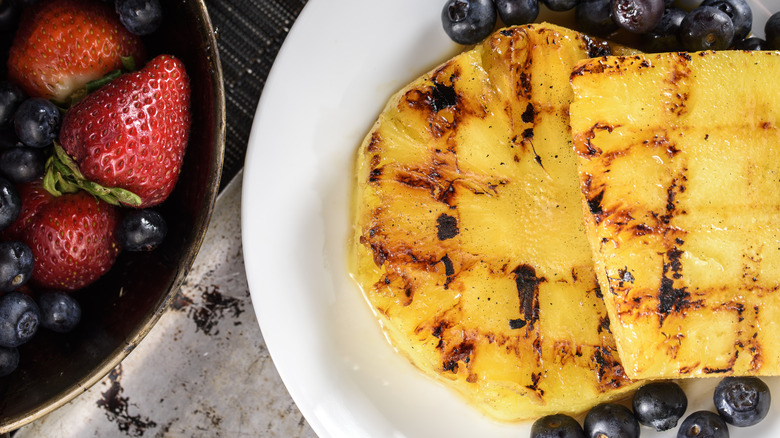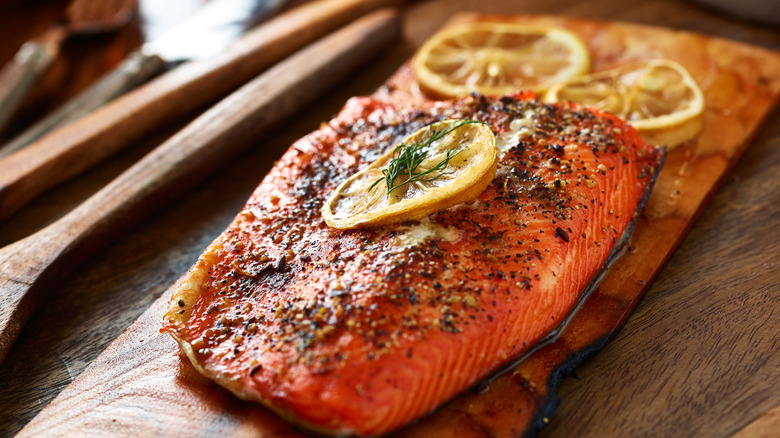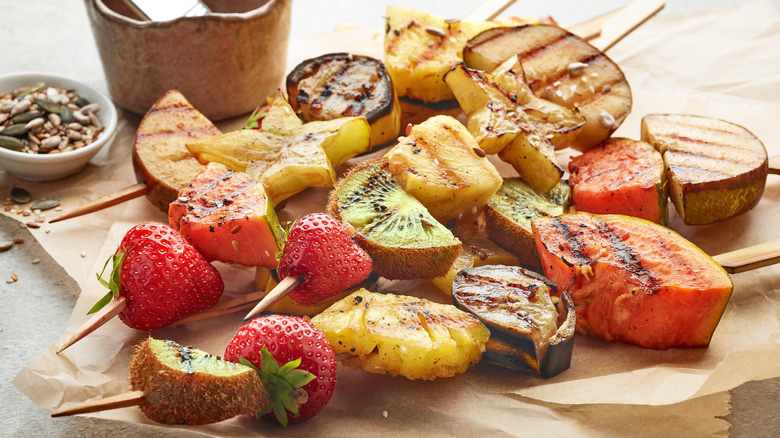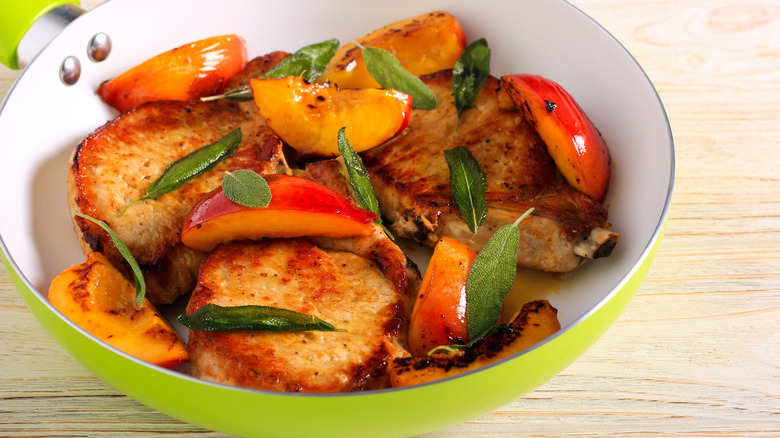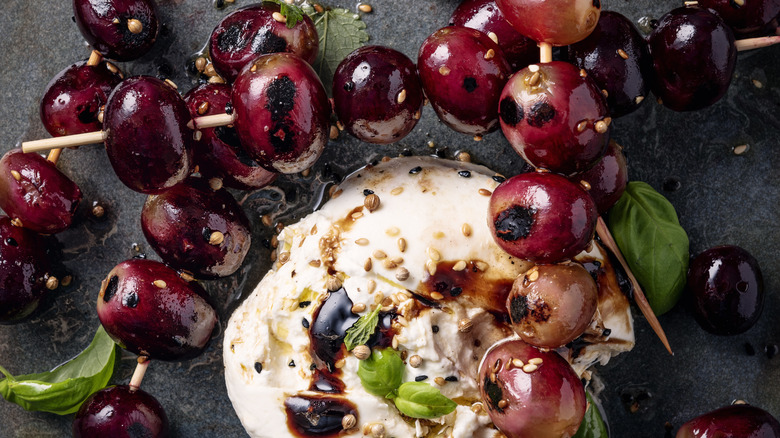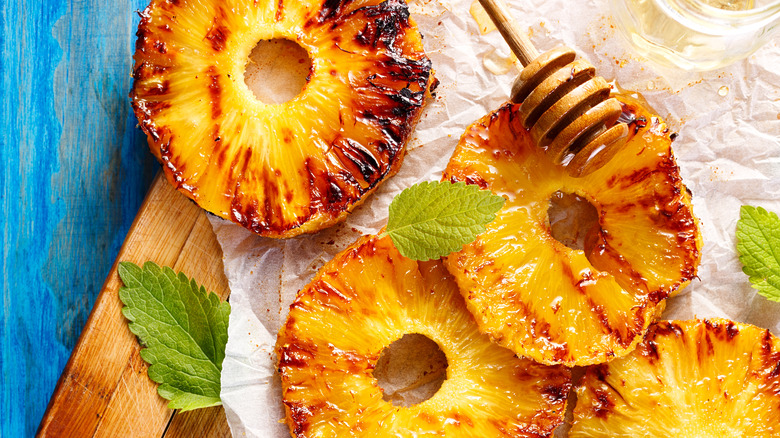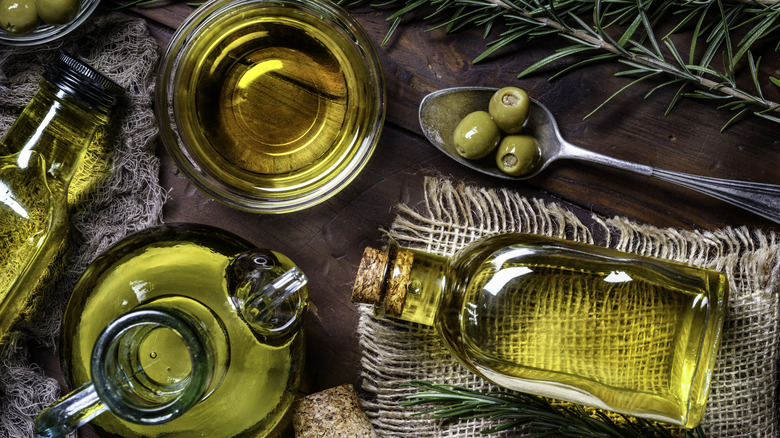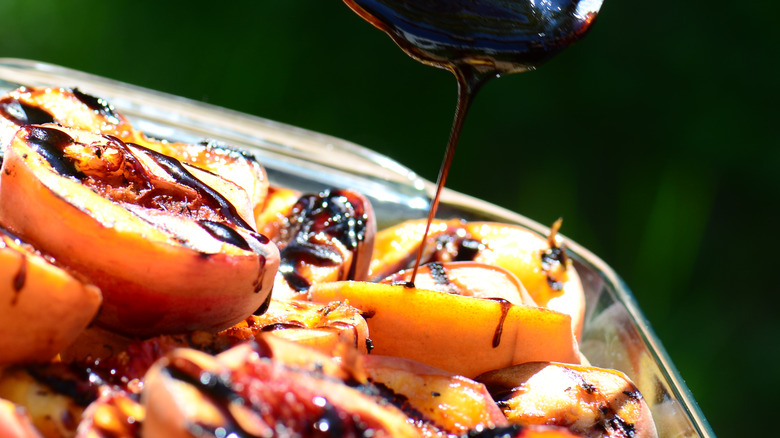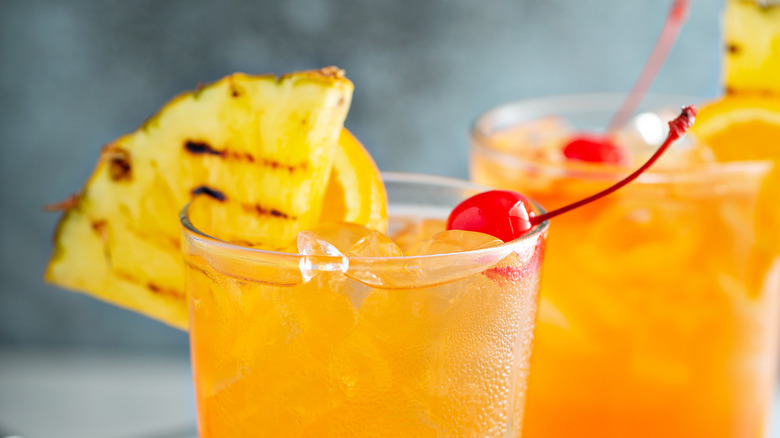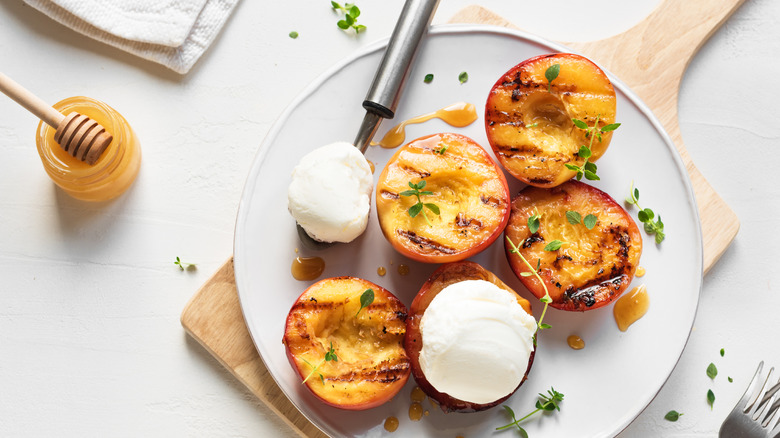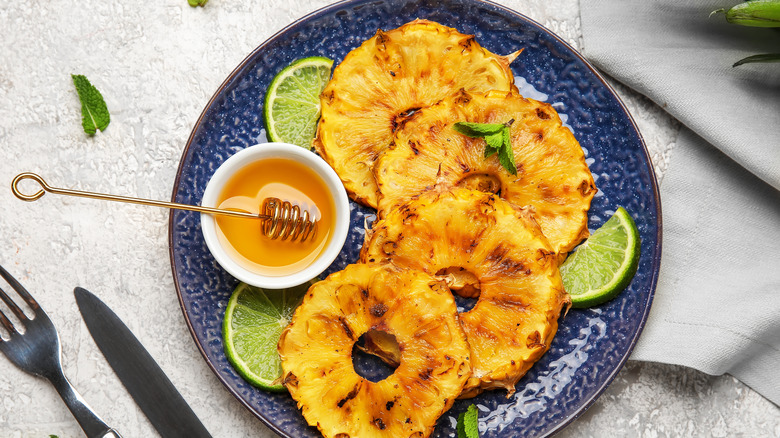15 Tips You Need When Grilling Fruit
A grill fire conjures up memories of smokey Fourth of July barbecues, racks of ribs slathered in a tangy sweet sauce, and sizzling sirloins guarded by a grill master in an ironic apron. Occasionally, you'll get the stray turkey burger, Impossible sausage, or even marinated tofu, but the truth is that most of us aren't using our grills to their full potential. In fact, one of the biggest mistakes new vegans and vegetarians make is giving away their grills. Grilled vegetables, sandwiches, cheeses, bread, and baked goods are next-level delicious. But the food group that many people overlook when it comes to grilling is fruits. Those sticky sweet jewels just get sweeter and juicier the second they come in contact with sizzling grates and an open flame, so why deprive them of reaching their full potential? If you're new to the game, follow these important tips you need when grilling fruit.
The steps for grilling meat and fruit are quite different, so it's important to educate yourself before you jump in, flames blazing. Fruit is more delicate, water-dense, and stickier than, let's say, a lamb chop. They require specific cooking temperatures, preparation, and sometimes even equipment. If you're going to do it, do it right. Now, let's get our grill on.
Start with a clean slate
While grill hygiene should be on everyone's radar, it's particularly important when it comes to grilling fruit. Fruit can be soft, delicate, and loaded with sugars, which means it will stick to those grates with everything it's got. A little oil can help, but the most important tactic to prevent sticking is scrubbing that grill nice and clean.
The myth that grills don't need to be cleaned because they get hot enough to kill bacteria isn't entirely true. Even if you don't plan on using any special cleaners, you still need to load up on a heavy dose of elbow grease. A wire or stiff-bristled brush and a lot of heat should do the trick. You'll want to heat that grill up until all of those leftover bacteria bits are charred, then scrub away with your brush until it's squeaky clean. Do this again when you fire it up before your next grilling extravaganza. Although you probably don't need special cleaners for your grill, a little vinegar never hurt anything. It can help get rid of any residual bacteria and dissolve buildup. Use it after you've heated and scrubbed your grill clean, and apply it with a rag to the grates. Although this may seem like quite a few steps, it's well worth it for safe grilling, and it is essential for grilling fruit.
Heat your grill first
Picture it now; grilled peaches, dripping with sticky juice and scalded with those famous deep black grill lines. The only true way to get there is by preheating your grill before you dive into grilling fruit. This is a good practice to have anyway, as it helps to burn off residual bacteria from your last grill-out. In addition, it can help to scald the fruit and to cook it quickly at a high temperature, which will prevent the fruit from drying out. After all, the warm syrupy juice is half the reason we grill fruit in the first place.
A great grilling hack you probably wish you knew sooner is to use an egg carton to get your charcoal grill going faster. The dry, flammable exterior and pockets of air will help that coal go up in flames. This also means you may not need to use any lighter fluid, which everyone knows puts off a distinct smell and flavor that isn't so savory. In the end, those grates will be piping hot and ready to scald and caramelize even the juiciest of fruits.
Spice it up
Foods like tofu, chicken, and lettuce require a certain level of additional flavor to be added before consumption. Fruit, on the other hand, can certainly hold its own in the flavor department. But that doesn't mean tofu and chicken should have all the fun. This is your opportunity to boost the flavor even further and spice up fruit with both savory and sweet spices.
Consider spices that are traditionally paired with sweet foods, like cinnamon, nutmeg, cardamom, or allspice. Use just a very little bit, and add it before the fruit is done cooking so the spices themselves can toast a little, releasing extra flavor and fragrance. If you're a fan of the spicy sweet combination, then opt for cayenne pepper, chili powder, Tajín, or even black pepper. Even just the addition of a little sea salt can go a long way. Just be sure to spice in moderation, and choose your pairings wisely.
Stone fruits love the grill
It's no secret that stone fruits have made their way to the top of the list of fruits you need to grill this summer. In fact, in an exclusive interview, Chef Abra Berens ranks the best fruits for grilling, and the top three include peaches, apricots, and cherries. For those unfamiliar with the term, stone fruits are fruits that contain one large pit instead of individual seeds. Examples include plums, nectarines, mangos, lychee, and olives. What do they all have in common? You'd better watch out for your teeth when chomping into them.
Stone fruits are notoriously sweet and tend to have a strong enough structure to them that holds up well on a grill. These fruits lose moisture as they heat, which concentrates their flavor. Grilled stone fruits often pair well with salads, cheeses, nuts, and other savory foods. Be sure to leave the skins on when grilling so they can act as a casing to hold in the juices and flavors. In fact, an elite way to grill stone fruits is by cutting them in half and cooking them skin-side-down, cut-side-up. This allows juice to pool where the pit has been removed, and the skins prevent sticking.
Don't forget about pineapple
One of the most iconic grilled fruits around has to be pineapple. It's sweet, tangy, and juicy, and packs quite a punch when it comes to flavor. Pineapples seem to have the ability to transport you to a tropical beach with a warm breeze in your hair and warm salt water lapping up on your toes. Once it's tossed on a hot grill, pineapple becomes even sweeter and more delectable. After removing the skin and core, slice the pineapple into rings and lay them flat on the preheated fiery grates.
There are plenty of seasonings that pair well with the fruit, but consider using a tiny dash of salt. Salt affects the taste of pineapple in an unexpected way; it actually makes it taste sweeter. It does this by deactivating the enzyme bromelain, which is what makes the roof of your mouth itch or swell when you've been feasting on pineapple. Don't overdo it — just a small amount of salt can do the trick. In addition, spices like cinnamon or allspice add layers of flavor to the fruit. Hot spices like cayenne are classically used when grilling pineapple to balance the intense sweetness of the fruit and add a little kick.
Use a wooden plank
Although plank grilling was originally used in Native American communities to cook fish like salmon, it's a great way to cook any meat, vegetable, fruit, or cheese. Grilling with wooden planks helps to create a barrier between the flame and the featured food. The wood heats up, which creates a crispy edge on the food it's coming in contact with, and also releases subtle woody flavors. Depending on the type of wood you're using, different undertones of flavor infuse each bite of the dish you're grilling up. Typically, for fruit dishes, grill masters use sweet woods like cherry or maple. Feel free to select a faster burning wood, as your fruit doesn't take as long to cook as a cut of steak.
Start by soaking your wooden plank. You can do this in water, brine, or even wine. For fruit, consider using light fruit juice, citrus water, or white wine. Heat your plank before adding cut fruit, and then keep a close eye on it as it cooks. Feel free to use the juice-infused board to cook your proteins or vegetables after the fruits are done. This will add to the complexity of your dish, and help to layer your main course with sweet undertones.
Try out skewers
When considering cooking fruits, the visual of juggling cherries or grapes over an open flame may seem comical. You'd lose half your bounty in a matter of seconds, leaving you with nothing but a hurting sweet tooth and disappointment. Don't give up on small fruits just yet. Consider using skewers, like you would for small vegetables and cuts of meat.
You should never use dry wooden skewers on a grill, because as we learned back in the caveman area, wood catches fire. Soak your skewers in water or juice until they are saturated. Thread those small or sliced fruits right onto the wooden sticks, and place them on the grill. While you're welcome to make an entire fruit shish-kabob, remember that many fruits pair nicely with meat and vegetables. For instance, layer pork, pineapple, orange slices, and red pepper together for a drool-worthy dinner creation. When all is said and done and your fruit is caramelized and ready to eat, be cautious removing it from the skewers. Because fruit is water dense, it retains heat and could easily burn your skin with just a few drips.
Pair with meat
Just because we're used to eating fruit for dinner or breakfast doesn't mean that it can't complement savory proteins in an exciting and adventurous way. If you're having trouble wrapping your brain around this combination, just think of your chicken and apple salad with pecans or a Thanksgiving turkey sandwich with cranberries and mayonnaise. The savory and sweet duo not only tantalizes the taste buds and adds complexity, but creates a balanced mouthfeel, as well.
Grill your fruit and proteins side by side. Pair chicken with citrus fruits, apricots, mangos, or peaches. Pork tastes particularly decedent paired with cranberries, pineapple, apricots, cherries, figs, and plumbs. Try your pork chops with the surprising fruit that will take them to the next level: peaches. Ducks can be enjoyed with darker berries and fruits like blueberries, cherries, prunes, currents, and pomegranates. And, of course, gamey red meats like lamb are often served with figs, dates, apricots, and prunes.
Get salty with cheese
Fruit and cheese go together like peanut butter and jelly. One's creamy and salty, and the other's sweet and sticky. This match-made-in-heaven makes for perfect hors d'oeuvres, breakfast, or dessert, but really it can be sprinkled in just about anywhere. After all, isn't fruit the perfect addition to a grilled cheese sandwich? Luckily, just like fruit, cheese can be grilled, too. In order to avoid a melty mess, always use a wooden plank when grilling cheese, and keep a close eye on it. It doesn't take long for the cheese to melt, as you probably know from baking brie or making cheesy eggs in the morning. Mild and soft cheeses pair well with fruits of all kinds, but there are some more daring combinations that you should have on your radar.
Consider pairing grilled pears with blue cheese, apples with sharp cheddar, and figs with smoked gouda. Don't forget about raspberries with baby Swiss, feta with watermelon, or peaches with mozzarella. When in doubt, do a little research, or taste them side by side before firing up that grill.
Add some sugar
Fruit on its own is incredibly sweet. Did you know just 1 cup of pineapple contains about 16 grams of sugar? And because it tastes even sweeter when cooked, you may be questioning if any additional sweetener is actually needed. And the answer is no. None is needed, but if you're looking for an ultra-sweet dessert that rivals cake and cookies, then it's time to bring out the big guns. Add a sweetener of choice to your fruit before it even hits the grill.
Standard white sugar works just fine, but it's always nice to play with the subtle flavors of other natural sweeteners. Consider brown sugar, maple syrup, or honey to sweeten your grilled fruit. You can even use sweet fruit syrups and juices like pineapple juice or lychee syrup to boost the sugar content. Keep in mind that liquid sweeteners will drip, so they work well in stone fruits that have had their pits removed leaving a place for the juice to puddle. You can also drizzle sticky sweaters on fruit after it's been cooked for a less-messy approach.
Splash with olive oil
When it comes to unexpected foods that pair well with olive oil, fruit is at the top of the list. In fact, some of the best fruit salad dressings contain olive oil. So it should be no surprise as olive oil has floral and fruity undertones. When it comes to grilling fruit, olive oil does more than just contribute to the flavor.
Drizzling or coating fruit in olive oil can help to preserve that juicy interior while giving it a slightly crispy exterior when grilled. If you'd rather enjoy the fresh flavors of high-quality olive oil, consider using it as a garnish instead, and drizzle it lightly on the fruit after it's come off of the grill. In fact, using olive oil instead of sugar, salt, or vinegar can give it a subtle richness and highlight fruits' natural earthy and floral notes. And because most fruits are relatively low in fat, this rich addition can make grilled fruits quite decedent and add some more substance to the situation.
Get saucy with it
Just because fruit is just about one of the juiciest foods in the book doesn't mean you can't sauce it up with additional flavor. Try dousing on every grill master's favorite, barbecue sauce, to your sliced and grilled pineapple. If you'd rather play it safe, consider drizzling cooked fruit with a balsamic reduction, or marinating fruit in a little balsamic vinegar before grilling. Speaking of marinades, if there is a dressing you frequently put on your strawberry spinach salad, go ahead and marinate those strawberries right in it before popping them on skewers on the grill. Even a smear of jam can go a long way if paired properly.
If you'd rather give your family or guests the option to dip their grilled fruit into a sauce, serve it on the side. A refreshing yogurt sauce is always a safe bet and can help to balance the ultra-sweet fruit. And then, of course, who doesn't love hot fudge? Even melted cheese fondu or whipped cream can make your grilled fruit memorable.
Grill fruit for cocktails
Summertime grill-outs aren't complete without a crash visit from your neighbors, tiki lights, and a cold beer or cocktail in hand. If you'd rather spring for a tropical blended drink or fruity martini loaded with fresh garnishes than a Bud Light, then consider adding grilled fruit to your next homemade cocktail. In fact, this summer you should be grilling fruit for all of your cocktails. Not only can grilled fruit be used as a beautiful garnish, but if you save those sticky sweet juices, they can be used as mixers. To do this, grill your fruit on aluminum foil to capture every last drop, and let it reduce during the cooking process.
If you've never tried grilled fruit in cocktails before, start with a simple classic that can't go wrong. Grilled citrus delicately balances the line between smokey and sweet and can add complexity and beauty to any drink. Slice thin rings of orange, grapefruit, lemon, or lime and scald them on the hot rods of the grill to create grill lines. The heat will help make the fruit extra juicy, and the grill lines will add a smokey flavor.
Serve with ice cream
We've played around quite a bit with both the salty-sweet and spicy-sweet combinations, but it's important to find contrast in temperature, as well. That's why the ultimate sidekick for grilled fruit is ice cream. While any flavor will do, consider using vanilla so as to not overpower the flavor of the fruit, which should be the main event. Coconut ice cream also tends to go especially nicely with tropical fruits.
For vegans and those who are lactose intolerant, don't fret. Plant-milk ice creams actually tend to be extra incredible when served alongside fruit, especially those made from cashews or coconut milk. If you're looking for a whole-food alternative, consider blending a frozen banana until it reaches the consistency of a soft serve. Add pure vanilla extract for a little flavor.
On the flip side, if you make your own homemade ice cream, consider adding grilled and cooled fruit as a flavoring. It's incredibly sweet, and the smokey flavors from the grill contribute to the overall complexity. Even Baskin Robbins is featuring grilled fruit ice cream as a unique twist on customer favorites.
Squirt with citrus
The most simple way to enhance the flavor of grilled fruit is to add just a squirt of citrus to the surface. Most grilled fruit is very sweet, so citrus helps to balance the intense sugar. You can do this before or after the fruit is grilled, and virtually any citrus fruit will do. However, there are some exceptional pairings that should be considered.
Tropical fruits like mango, lychee, and pineapple taste fantastic with lime juice. Mediterranean fruits like apricots and figs lemon or orange juice. Consider using some unique citrus fruit juices like pomelo, key lime, clementines, and citron. For a more mellow alternative, mix citrus juice with high-quality extra virgin olive oil and honey for a sweet and tangy dressing that can be drizzled on any fruit after it comes off the grill. As a vegan alternative, use maple syrup or agave instead of honey.
